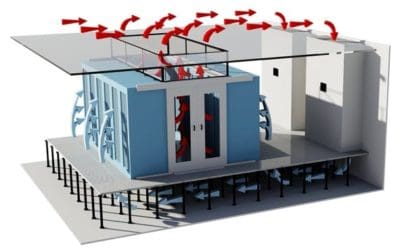In an era where data reigns supreme, the importance of efficiently storing and accessing this digital treasure cannot be overstated. Enter the colocation data center, a pivotal solution for businesses seeking to maximize their data management capabilities while minimizing costs. This concept, often abbreviated as colo data center, represents the practice of renting space for servers and other computing hardware at a facility designed specifically for this purpose. Such spaces not only offer physical security and scalable bandwidth but also bring forth a collaborative environment that can significantly boost performance and reliability. The growing reliance on digital platforms across various sectors underscores the necessity of colocation data center services, highlighting their role in the modern digital infrastructure.
What is Data Center Colocation?
A colocation data center, commonly known as a ‘colo’, is a facility that offers businesses the ability to rent space for their servers and other computing hardware. This model allows multiple customers to place their equipment in a shared location, which is typically owned and maintained by a third-party provider. The primary appeal of colocation is that it enables companies to leverage the advanced infrastructure of a large data center without bearing the full cost of building and maintaining such a facility themselves.
Key Aspects of Colocation Data Centers
- Shared Infrastructure Colocation data centers provide an environment where hardware from various companies coexists. Companies retain ownership of their equipment but share the physical space, power, cooling, and connectivity infrastructure with other tenants. This setup not only helps in reducing costs but also in simplifying operations, as the data center operator handles the maintenance of the facility.
- Geographic Flexibility Companies often choose colocation because it allows them to strategically place their IT assets in various locations. This is particularly beneficial for businesses with a wide geographical reach, as it helps in optimizing the performance and availability of applications by reducing latency for end-users.
- Cost Efficiency Opting for colocation can significantly reduce the financial burden associated with data management. Companies save on the capital expenditures of building their own data center facilities. Instead, they pay for only the space they need, with the added benefit of predictable monthly costs.
- Technical and Operational Support Colocation providers typically offer robust support services, which may include the installation of equipment, troubleshooting, and routine maintenance. This reduces the need for a large in-house IT staff, as many technical tasks are delegated to the data center’s skilled personnel.
- Enhanced Security and Reliability Data centers are built to high specifications for security and operational reliability, featuring measures like backup power systems, advanced fire suppression, and multiple layers of physical security. This ensures that critical business applications remain available and secure.
- Scalability As businesses grow, their IT infrastructure needs can change. Colocation data centers offer the flexibility to easily scale up or down, accommodating additional equipment or increasing power and bandwidth requirements without the complexities involved in expanding a private data center.
Types of Colocation
- Retail Colocation: Businesses rent out a specific amount of rack space (e.g., one or more server racks), which is ideal for small to medium-sized enterprises or those with moderate IT needs.
- Wholesale Colocation: Larger organizations might opt for wholesale colocation, where they lease entire suites or modules within the data center. This option is suited for businesses with significant data infrastructure requirements.
Responsibilities in a Colocation Environment
While colocation facilities manage the physical infrastructure, businesses still retain responsibility for their own data and hardware. This includes managing the software, data storage, and ensuring that their systems are secure against cyber threats. This dual responsibility model allows businesses to benefit from high-end data center capabilities while maintaining control over their critical IT assets.
Types of Colocation Facilities
Colocation data centers, often referred to as multi-tenant data centers (MTDCs), accommodate a variety of organizational needs through different types of colocation facilities. These facilities are categorized mainly into retail colocation, wholesale colocation, and hybrid cloud-based colocation. Each type serves distinct purposes and caters to specific business requirements.
Retail Colocation
Retail colocation is a popular choice for small to medium-sized businesses that require data center services but do not need large spaces or excessive power. In this arrangement, businesses lease space within a data center, typically a rack, a part of a rack, or a caged-off area. This model provides clients with turn-key data center services including power, cooling, security, and access to telecommunications carriers and internet service providers (ISPs). Retail colocation facilities manage day-to-day operations, allowing customers to focus on maintaining their equipment within the provided space. Contracts for retail colocation are often flexible, ranging from 1 to 3 years, and are structured as leases or license agreements.
Wholesale Colocation
Wholesale colocation is suited for large enterprises or government agencies that require extensive data storage and processing capabilities. This type of colocation offers space and power in larger quantities, typically leasing entire suites or buildings. Clients in wholesale colocation are responsible for managing the day-to-day operations of their leased spaces, which can range from 10,000 to 20,000 square feet or more. These facilities provide fewer connectivity options compared to retail colocation, focusing instead on providing substantial power capacities ranging from 1 to 5 megawatts (MW). Wholesale colocation contracts are usually long-term, ranging from 5 to 10 years, offering a cost-effective solution for large-scale data management needs.
Hybrid Cloud-Based Colocation
Hybrid cloud-based colocation represents a flexible approach to data storage and application delivery. This model combines in-house data center space with space rented from colocation facilities. It allows businesses to maintain control over their IT infrastructure while leveraging the benefits of both on-premises and colocation facilities. Hybrid cloud colocation is ideal for organizations that require the agility to scale their IT resources up or down quickly, depending on their operational needs. This setup enables companies to optimize their data management strategies by integrating the best aspects of colocation and cloud computing environments.
Each type of colocation facility offers unique advantages and is designed to meet the diverse needs of businesses in today’s digital landscape. Whether it’s the turn-key solutions of retail colocation, the extensive resources of wholesale colocation, or the flexible integration provided by hybrid cloud-based colocation, organizations can select the option that best aligns with their data management requirements and strategic goals.
Benefits of Data Center Colocation
Cost Efficiency
Colocation data centers offer a significant advantage in terms of cost efficiency. By sharing data center resources, businesses can avoid the high costs associated with building and maintaining a dedicated facility. This includes savings on power, cooling, and ongoing maintenance. The model shifts capital expenditures to more predictable operating expenses, allowing companies to budget more effectively and allocate resources to growth-focused initiatives. Additionally, the economies of scale achieved by colocation providers mean lower costs for energy and infrastructure, further enhancing the cost benefits.
Scalability
Scalability is another critical benefit of colocation data centers. Businesses can easily scale their IT infrastructure by renting additional rack space and adding more servers as needed, without incurring significant infrastructural expenses. This flexibility is essential for accommodating growth or fluctuating demands without the need for large upfront investments. Colocation allows organizations to respond quickly to changes, ensuring they have the necessary IT resources without overextending financially.
Reliability and Uptime
Data center colocation is designed to maximize uptime and reliability. Facilities offer high levels of redundancy in power and cooling systems to ensure that critical IT infrastructure remains operational, even during disruptions. This reliability is crucial for businesses where downtime directly impacts revenue and customer trust. Furthermore, colocation providers typically offer stringent uptime Service Level Agreements (SLAs), providing businesses with assurances of consistent service availability.
Security
Security is a paramount concern for any organization, and colocation data centers excel in providing robust physical and cyber security measures. Facilities are equipped with advanced security features such as video surveillance, biometric access controls, and on-site security personnel. Additionally, colocation centers deploy comprehensive cybersecurity protocols including firewalls and intrusion detection systems to protect against digital threats. This multi-layered security approach ensures that both the physical and digital aspects of a business’s critical infrastructure are well-protected.
Access to Skilled Personnel
Colocation data centers provide access to a team of certified IT professionals who continuously monitor, manage, and maintain the facility. This access to skilled personnel reduces the burden on a company’s in-house IT staff, allowing them to focus on strategic initiatives rather than routine maintenance. These experts act as extensions of the customer’s IT team, providing valuable support and enabling businesses to adapt and manage their IT strategies effectively. This support is crucial for maintaining high operational standards and ensuring IT systems are optimized for performance and reliability.
Difference Between Data Center Colocation and Cloud Services
Ownership and Control
One of the fundamental distinctions between colocation and cloud services lies in the realm of ownership and control. In colocation, businesses own their physical servers and hardware, granting them a high degree of control over their IT infrastructure. This model is particularly beneficial for organizations that require stringent security measures or have specific compliance needs. They are responsible for the maintenance and upgrades of their equipment, housed within a third-party data center that provides the necessary space, power, cooling, and network services.
Conversely, in cloud services, the hardware is owned and managed by the cloud provider. Customers do not have physical access to the hardware, which may limit their control over the server and storage configurations. This setup is advantageous for organizations that prefer not to manage physical infrastructure but can introduce dependencies on the cloud provider’s management policies and security practices.
Cost Structure
The cost implications of colocation versus cloud services are also significantly different. Colocation generally involves higher upfront costs due to the necessity of purchasing hardware such as servers and storage solutions. However, once these initial investments are made, the ongoing costs are relatively stable and predictable, encompassing fees for space rental and utilities in the data center.
Cloud services, on the other hand, typically offer a lower entry cost with a pay-as-you-go pricing model. This approach can be attractive for businesses looking for flexibility and minimal initial financial outlay. However, costs can vary based on the volume of data and the intensity of resource usage, potentially leading to higher operational expenses over time, especially when scaling or when additional services like data egress or enhanced security are required.
Scalability and Flexibility
Scalability and flexibility are critical factors in the comparison between colocation and cloud services. Colocation offers a degree of scalability by allowing businesses to physically add more hardware to their setup. This process, though potentially slow and involving significant logistics, provides tailored scalability that can meet specific performance and configuration requirements.
Cloud services excel in providing immediate scalability. Resources can be adjusted dynamically, allowing businesses to respond swiftly to changes in demand without the logistical challenges of physical hardware adjustments. This model supports rapid growth and fluctuating needs but may come at a premium cost as resource usage increases.
Both colocation and cloud services offer unique advantages and challenges. The choice between them often depends on a company’s specific needs regarding control, cost, and scalability. Businesses might find that a hybrid approach, utilizing both colocation for critical, sensitive operations and cloud services for flexible, scalable needs, could offer a balanced solution.
How to Choose a Colocation Data Center
Consider the Location
Choosing the right location for a colocation data center is crucial. It should be easily accessible for your staff, especially in emergencies, to ensure quick physical access to servers and other hardware. The location should also be safe from natural disasters like earthquakes, floods, and hurricanes. Additionally, consider network latency and the availability of ample power and fiber paths, which are essential for optimal network performance and business operations.
Evaluate the Infrastructure
The infrastructure of a colocation data center must meet your current and future needs. Facilities should offer flexible and scalable solutions, allowing for easy integration of new hardware, software, and networking components. Ensure that the data center can accommodate growth without hindering your business operations over time. Check for the availability of additional space, power, and connectivity options to avoid limitations as your business scales.
Check Security Measures
Security at colocation data centers is paramount, given that they house your valuable data and critical IT infrastructure. The center should enforce stringent physical security measures such as biometric authentication, access controls, round-the-clock surveillance, and secure fencing. Additionally, robust digital security protocols including firewalls, intrusion detection systems, and DDoS protection should be in place to safeguard against cyber threats.
Assess Redundancy and Reliability
Redundancy is key to ensuring high availability and minimizing downtime. Inquire about the redundancy configurations employed, such as N+1, N+2, or 2N+1 setups, with 2N+1 providing the highest level of redundancy. A reliable colocation provider should offer redundant power supplies, cooling systems, and network connections. Check for a proven track record in uptime, ideally with a Tier III or IV rating, to guarantee that your services remain operational and available.
Selecting the right colocation data center involves a careful assessment of these factors to ensure that the facility aligns with your business needs and provides a secure, reliable, and scalable environment for your IT infrastructure.
The significance of colocation data centers in today’s digitally driven economy cannot be overstated, with their role as a cornerstone of modern IT infrastructure becoming increasingly pronounced. As businesses continue to navigate the challenges of data management and storage, the adoption of colocation services presents a viable pathway to enhance operational efficiency, bolster security, and ensure robust business continuity planning. This exploration serves as a foundational guide for organizations looking to embrace the strategic and operational benefits offered by colocation facilities, urging a thoughtful consideration of the broader implications for enterprise IT strategy.




